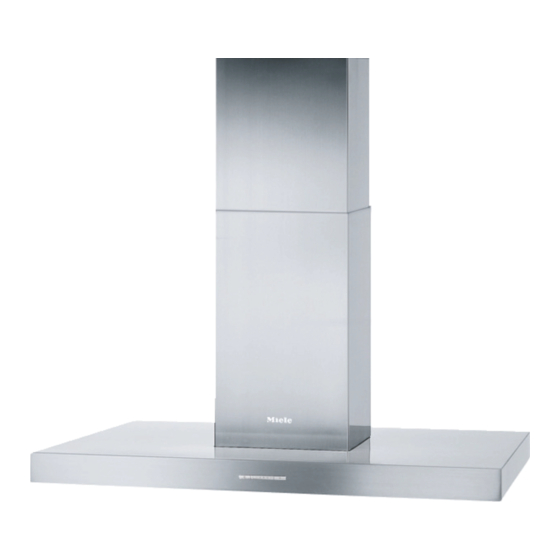- ページ 40
換気フード Miele PUR 98 DのPDF 操作およびインストール手順をオンラインで閲覧またはダウンロードできます。Miele PUR 98 D 48 ページ。 Ventilation system
Miele PUR 98 D にも: 操作およびインストール手順 (40 ページ), 操作およびインストール手順 (44 ページ), 操作およびインストール手順 (44 ページ), マニュアル (48 ページ)

Connection for air extraction
Before installation, it is important
to read the information given on the
following pages as well as the
"Appliance dimensions" and the
"Warning and Safety instructions" at
the beginning of this booklet. This is
particularly crucial when using the
rangehood at the same time as a
heating appliance that relies on
oxygen from the same room, which
could result in the build-up of toxic
fumes.
The rangehood should be installed
according to local and national
building regulations. Seek approval
from the building inspector where
necessary.
Only use smooth pipes or flexible
ducting made from approved non-
flammable materials for exhaust
ducting.
To achieve the greatest possible air
extraction with the lowest noise level,
please note the following:
- The diameter of the exhaust ducting
should not be less than 150 mm.
- If flat ducting is being used, the
cross-section must not be smaller
than the cross-sectional area of the
exhaust connection.
- The exhaust ducting should be as
short and straight as possible.
- Only use wide radius bends.
- The exhaust ducting must not be
kinked or compressed.
- Ensure that all connections are
strong and airtight.
40
- If the ducting has flaps, these must
be opened when the rangehood is
switched on.
Remember that any constriction of
the airflow will reduce extraction
performance and increase operating
noise.
If the exhaust is ducted through an
outside wall, a telescopic wall vent or
a roof vent (available as an optional
accessory) is recommended.
If the exhaust air is to be ducted into
a vent flue, the ducting must be
directed in the flow direction of the
flue.
If the flue is used by several
ventilation units, the cross-section of
the flue must be large enough.
Where ducting is horizontal, it must
be laid to slope away at at least 1 cm
per metre. This is to ensure that
condensate cannot drain back into
the rangehood.
If the exhaust ducting is to run
through rooms, ceiling space etc.
there may be great variations in
temperature between the different
areas. The problem of condensation
will need to be addressed. The
exhaust ducting will need to be
suitably insulated.
